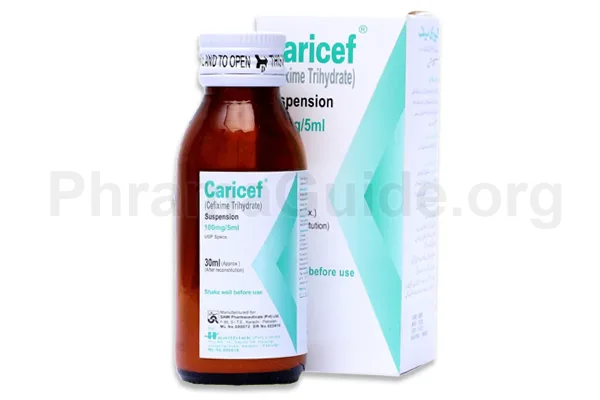Caricef Syrup is an antibiotic medication, that belongs to the class of drugs known as cephalosporins. Caricef syrup is primarily used to treat bacterial infections. It is mostly recommended for children and adults where a low dose of medicine is needed. The following are some common uses of Caricef Syrup:
- Respiratory Tract Infections: Caricef syrup is often used for the treatment of respiratory tract infections, including acute bronchitis, community-acquired pneumonia, and sinusitis. It is effective against a range of bacteria commonly associated with these infections.
- Urinary Tract Infections: Caricef syrup can be used to treat uncomplicated urinary tract infections (UTIs) caused by susceptible bacteria. It may be prescribed for infections of the bladder (cystitis) or the lower urinary tract.
- Otitis Media: Caricef syrup is sometimes used to treat middle ear infections, known as acute otitis media, in both children and adults. It is effective against certain bacteria that commonly cause these types of infections.
- Pharyngitis and Tonsillitis: Caricef syrup may be used to treat bacterial pharyngitis (sore throat) and tonsillitis caused by susceptible bacteria. However, it is important to note that many cases of sore throat are viral in nature and do not require antibiotic treatment.
Off-label Uses of Caricef Syrup
Caricef syrup is commonly used in pediatric populations for approved indications. However, in certain situations, a healthcare professional may consider off-label use of Caricef syrup in children for different bacterial infections or in specific dosing regimens depending on the child’s condition and response to treatment.
- Prophylaxis for Recurrent Urinary Tract Infections (UTIs): In some cases, Caricef syrup may be used off-label as a prophylactic (preventive) treatment to reduce the recurrence of UTIs in individuals who have a history of frequent UTIs. The decision to use Caricef syrup for this purpose should be made by a healthcare professional based on individual circumstances.
- Certain Respiratory Tract Infections: While Caricef syrup is commonly used for respiratory tract infections such as acute bronchitis and community-acquired pneumonia, its off-label use may be considered in specific situations, such as when the causative bacteria are known or suspected to be susceptible to Caricef and other first-line treatment options are not appropriate or available.

What is Caricef?
Caricef Syrup is one of the leading brands of Cefixime in oral liquid form, manufactured and marketed by Sami Pharmaceuticals (Pvt) Ltd, Pakistan.
Caricef Alternatives : Other Cefixime Brands
The following are some alternative brands of Caricef Syrup and their manufacturer.
- Cebosh : Bosch Pharmaceuticals (Pvt) Ltd, Pakistan.
- Cefiget : Getz Pharmaceuticals (Pvt) Ltd, Pakistan.
- Cefim : Hilton Pharmaceuticals (Pvt) Ltd, Pakistan.
- Cefspan : Barrett Hodgson Pakistan (Pvt) Ltd.
- Fixitil : Tabros Pharma (Pvt) Ltd, Pakistan.
- Icef : ICI Pakistan Ltd.
- Linzim : Bosch Pharmaceuticals (Pvt) Ltd, Pakistan.
- Magnett : S.J. & G Fazul Ellahie (Pvt) Ltd, Pakistan.
- Maxima : Macter International (Pvt) Ltd.
- Maxpan : Indus Pharma (Pvt) Ltd, Pakistan.
- Omixim : Searle Pakistan (Pvt) Ltd.
Caricef : Available Formulations and Strengths
Presently, Caricef is available in Syrup, Tablets, and Capsule forms with the following strengths.
Caricef Syrup : 100mg/5ml strength
Caricef DS Syrup : 200mg/5ml strength
Caricef Tablet : 200mg, and 400mg strengths
Caricef Capsules : 400mg strength
Who Should Not Use Caricef?
Caricef syrup, like any medication, has certain contraindications, which are specific situations or conditions in which the use of Caricef is not recommended due to potential risks or adverse effects.
Hypersensitivity: Caricef syrup should not be used in individuals who have a known hypersensitivity or allergy to Caricef or any other cephalosporin antibiotics. Allergic reactions can range from mild skin rashes to severe allergic reactions like anaphylaxis, which is a life-threatening condition.
Previous severe allergic reaction: If an individual has previously experienced a severe allergic reaction (such as anaphylaxis) to Caricef or any other cephalosporin antibiotics, the use of Caricef syrup is contraindicated.
Severe kidney impairment: Caricef is primarily eliminated from the body through the kidneys. In individuals with severe kidney impairment or end-stage renal disease, the clearance of Caricef may be significantly reduced, leading to the accumulation of the drug. Therefore, Caricef syrup should be used with caution or avoided in individuals with severe kidney impairment.
History of pseudomembranous colitis: Caricef syrup should be used with caution in individuals with a history of pseudomembranous colitis, a severe inflammation of the colon typically associated with the overgrowth of the bacterium Clostridium difficile. Antibiotics can potentially worsen this condition and should be used judiciously.
Preterm infants and neonates: Caricef syrup is not recommended for use in preterm infants and neonates due to the limited data available regarding its safety and efficacy in this population.
What is the Recommended Daily Dosage of Caricef?
Caricef Syrup Dose for Adults and Children (over 12 years of age):
- 400mg (20ml of syrup) taken once daily or divided into two doses of 200mg (10ml) taken every 12 hours.
- In some cases, the healthcare professional may adjust the dosage based on the severity of the infection.
Caricef Syrup Dose for Children (under 12 years):
- The dosage of cefixime syrup for children is based on their body weight and is determined by a healthcare professional. It may vary depending on the specific condition being treated and the child’s age.
How Caricef Works?
Caricef Syrup works by binding to and inhibiting an enzyme called penicillin-binding protein (PBP). PBPs are involved in the final stages of bacterial cell wall synthesis, which is essential for the structural integrity and stability of bacterial cells. By inhibiting PBPs, Caricef disrupts the cross-linking of the bacterial cell wall components, leading to weakened cell walls and eventual cell lysis (breaking down).
Related Links:

Leave A Comment